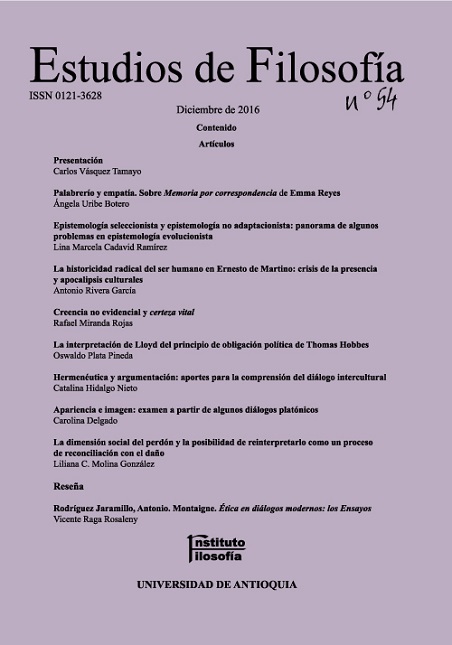Non-Evidential Belief and Vital Certainty
DOI:
https://doi.org/10.17533/udea.ef.n54a05Keywords:
Vital certainty, doubt, normative role, hinge proposition, anti-intellectualism, skepticalAbstract
This paper argues that the notion of explicit belief in Ortega y Gasset (1946) and Wittgenstein (1969) requires a non-intellectualist understanding of certainty, what is called vital certainty. It is argued that the normative role of the hinge propositions prevents skeptic doubt and, in turn, enables epistemology. This normative role is understood as a-epistemic, even if we can affirm a sui generis use of ''I know''. Finally, skeptical reading is discussed as a possible case of loss of certainty, and how vital certainty responds to these cases.
Downloads
References
Ariso, J. M. (2013a). Wittgenstein and the Possibility of Inexplicably Losing Certainties, en: Philosophical Papers, 42:2, pp. 133-150.
Ariso, J. M. (2013b). Raciovitalismo y forma de vida. La noción orteguiana de ‘creencia’ comparada con el concepto wittgensteiniano de ‘certeza’, en: Revista de Estudios Orteguianos, 27, pp. 107-128.
Bax, Ch. (2013). Reading on Certainty through the Lens of Cavell: Scepticism, Dogmatism and the ‘Groundlessness of our Believing, en: International Journal of Philosophical Studies, 21:4, pp. 515-533.
Cavell, S. (2003). Reivindicaciones de la razón. Wittgenstein, escepticismo, moralidad y tragedia. Madrid: Síntesis.
Coliva, A. (2010). Moore and Wittgenstein. Scepticism, certainty and common sense. London: Palgrave.
Coliva, A. (2013). Hinges and Certainty. A Précis of Moore and Wittgenstein. Scepticism, Certainty and Common Sense, en: Philosophia, 41: pp. 1–12
Fernandois, E. (2013). Ni fundacionismo ni coherentismo. Una lectura antropológica de Sobre la certeza, en: Revista de Filosofía, 69: pp. 99-117.
Firth, R. (1967). The Anatomy of Certainty, en: Philosophical Review, 76 (1): pp. 3-27.
Glock, H. (1996). A Wittgenstein Dictionary. Oxford: Blakwell.
Iczkovits, Y. (2012). Wittgenstein’s Ethical Thought. Basingstoke: Palgrave Macmillan.
Lewis, C. I. (1929). Mind and the World Order. New York: Dover.
Miranda, R. (2014). Bootstrapping y justificación a priori, en: Discusiones Filosóficas Vol. 15, No 25, pp. 83 – 94.
Miranda, R. (Por venir). Sobre el abuso de lo necesario a posteriori, en: Revista TRANS/FORM/AÇÃO, Volumen 40, fascículo I.
Moore, G. E. (1959a). A Defence of Common Sense, en: Philosophical Papers, New York: Collier Books, pp. 106 – 133.
Moore, G. E. (1959b). Proof of an External World, en: Philosophical Papers. New York: Collier Books, pp. 147 – 170.
Moore, G. E. (1959c). Certainty, en: Philosophical Papers. New York: Collier Books, pp. 226 – 251.
Moyal-Sharrock, D. (2004a). Understanding Wittgenstein’s On Certainty. Basingstoke: Palgrave Macmilan.
Moyal-Sharrock, D. (2005). Unravelling Certainty, en Moyal-Sharrock, D. & Brenner, W. eds. Readings of Wittgenstein’s On Certainty. Hampshire: Palgrave Macmillan.
Moyal-Sharrock, D. (2013). Beyond Hacker’s Wittgenstein: Discussion of HACKER, Peter (2012) ‘Wittgenstein on Grammar, Theses and Dogmatism’, en: Philosophical Investigations 35:1, 2012, pp. 1–17, en: Philosophical Investigations 36:4, pp. 355 - 380
Ortega y Gasset, J. (1946). Ideas y creencias. En Ortega y Gasset, J. Obras Completas, Tomo V, Madrid: Revista de Occidente.
Reed. (2011). Certainty. The Stanford Encyclopedia of Philosophy. Edward N. Zalta (ed.). Recuperado el 9 de enero de 2016 en: http://plato.stanford.edu/ archives/win2011/entries/certainty/
Schulte, J. (2005). Within a System, en Moyal-Sharrock, D. & Brenner, W. eds. Readings of Wittgenstein’s On Certainty. Hampshire: Palgrave Macmillan, pp. 59-75.
Stroll, A. (1994). Moore and Wittgenstein on Certainty. New York: Oxford University Press.
Williams, M. (2004b). Wittgenstein, truth and certainty, en: M. Kölbel & B. Weiss (Eds.). Wittgenstein’s Lasting Significance. Londres-New York: Routledge. pp. 249 – 284.
Williams, M. (2005). Why Wittgenstein Isn’t a Foundationalist? en: Moyal -Sharrock/Brenner. Ludwig Wittgenstein: Later Works. pp. 47-58.
Wittgenstein, L. (1953). Philosophical investigations. Oxford: Blackwell.
Wittgenstein, L. (1969). On Certainty. Anscombe & G.H. von Wright (eds.). New York: Harper & Row.
Wright, C. (2003). Wittgensteinian Certainties, en: McManus, D. (ed.). Wittgenstein and Scepticism. Londres: Routledge, pp. 22-55.
Wright, C. (2004). On Epistemic Entitlement: Warrant for Nothing (and Foundations for Free)? en: Proceedings of the Aristotelian Society, 78, pp.167-212.
Published
How to Cite
License
Copyright (c) 2016 Rafael Miranda Rojas

This work is licensed under a Creative Commons Attribution-NonCommercial-ShareAlike 4.0 International License.
Authors who publish with this journal agree to the following terms:
1. The Author retains copyright in the Work, where the term "Work" shall include all digital objects that may result in subsequent electronic publication or distribution.
2. Upon acceptance of the Work, the author shall grant to the Publisher the right of first publication of the Work.
3. The Author shall grant to the Publisher a nonexclusive perpetual right and license to publish, archive, and make accessible the Work in whole or in part in all forms of media now or hereafter known under a Creative Commons Attribution-NoCommercia-ShareAlike (CC BY-NC-SA 4.0), or its equivalent, which, for the avoidance of doubt, allows others to copy, distribute, and transmit the Work under the following conditions: (a) Attribution: Other users must attribute the Work in the manner specified by the author as indicated on the journal Web site;(b) Noncommercial: Other users (including Publisher) may not use this Work for commercial purposes;
4. The Author is able to enter into separate, additional contractual arrangements for the nonexclusive distribution of the journal's published version of the Work (e.g., post it to an institutional repository or publish it in a book), as long as there is provided in the document an acknowledgement of its initial publication in this journal;
5. Authors are permitted, and Estudios de Filosofía promotes, to post online the preprint manuscript of the Work in institutional repositories or on their Websites prior to and during the submission process, as it can lead to productive exchanges, as well as earlier and greater citation of published work (see The Effect of Open Access). Any such posting made before acceptance and publication of the Work is expected be updated upon publication to include a reference to the Estudios de Filosofía's assigned URL to the Article and its final published version in Estudios de Filosofía.















